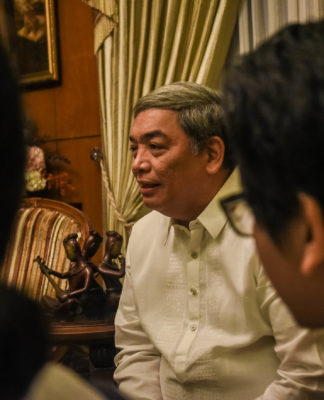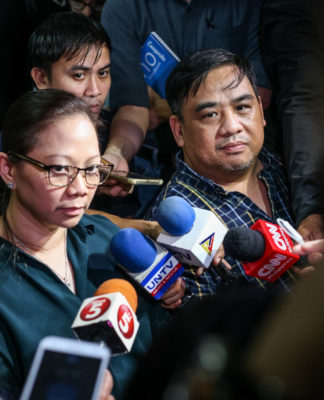DEPARTMENT of Trade and Industry (DTI) Sec. Manuel Roxas III challenged Thomasians to harness higher value skills, particularly in information technology, to help the country be more competitive.
In a symposium at the Medicine Cinematorium, Roxas that higher value skills would allow the country to compete effectively with dynamic economies and would ensure that “we are not only to survive but create wealth so that your next 50 years (will be) much better than the last 50.”
Sponsored by the Chemical Engineering Society of UST, the forum tackled the theme “Re-engineering the Philippine Economy Towards Global Excellence and Technology Advancement.”
Roxas said the Philippine economy could be compared with a “four-engine jet,” with consumption, investment, net export, and the government for parts. He explained the four components would not be enough to boost the economy.
“We need to re-engineer or to re-structure the drivers so that our collective jet plane will be able to provide everyone a much better (and a) much higher quality of life,” Roxas said.
Furthermore, he said that it is important to focus on higher value skills in intensive sectors that process information.
“This is where you (students) come in. In the information age, those who are able to process information are going to be rewarded because there is more wealth generated by one person in front of the desktop than whatever crop you can plant in three hectares,” he said.
As part of the economy’s re-engineering, Roxas said the Macapagal-Arroyo government is firmly implementing a policy of transparency.
“Every choice that the government makes is going to be undertaken, where the decisions will only be made within the context of what is necessary, “ he said.
On the other hand, Department of Science and Technology (DOST) Undersecretary Fortunato dela Peña said that the DOST is working for the improvement of the agricultural sector, the information and communication technology sector, and the tourism sector to prepare Filipinos for the future.
“I think what we need here is to continue our efforts toward human resource development, building research capability, and preparing the facilities that will be needed for these new technologies,” Dela Peña said.
He added that he is pushing for more programs to support small and medium enterprises.
“We will intensify, expand, and improve our services in support of small and medium (scale) enterprises, whether it is in the area of product development, process improvement, or testing of quality assurance services,” dela Peña said.
Furthermore, he encouraged universities and industries to help each other in research and development, training and continuing education, consultation and extension services, on-the-job training of students, policy-making and advocacy, technology-based enterprise and spin-offs, and granting industry-oriented units.
“Industries can benefit from the expertise found in the university and the university can benefit from the faculty involved in the training on continuing education, to get to know the human resource development needs in the industry,” dela Peña said. John Ferdinand T. Buen and Teodoro Lorenzo A. Fernandez















